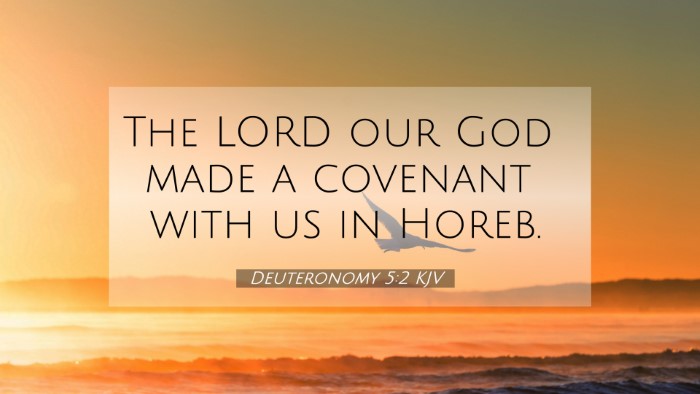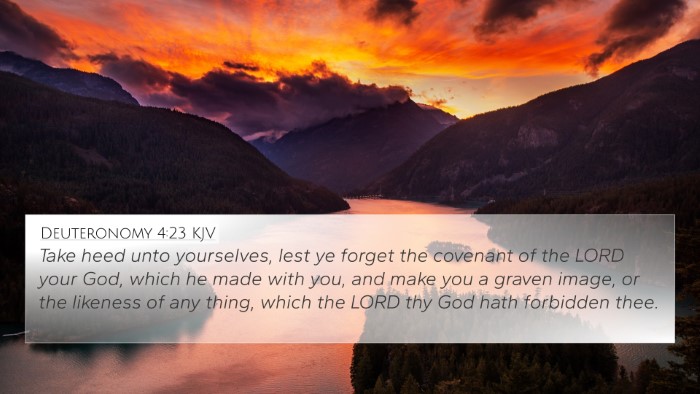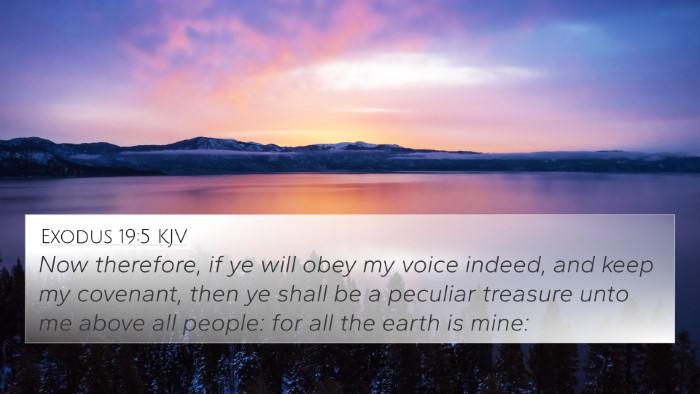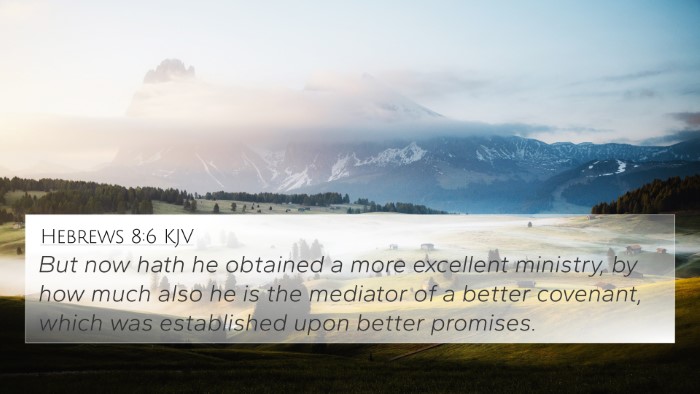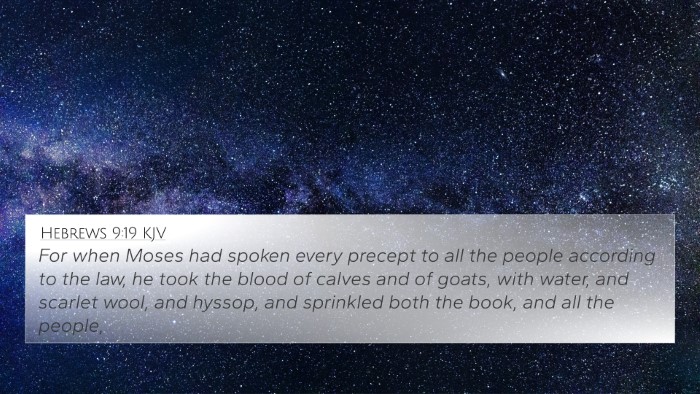Understanding Deuteronomy 5:2
Deuteronomy 5:2 states: "The Lord our God made a covenant with us at Horeb." This verse introduces the importance of the covenant God established with the Israelites, emphasizing His authority and their obligations as His chosen people.
Key Themes in Deuteronomy 5:2
This verse encapsulates several critical themes in the Biblical narrative:
- Covenant Relationship: It highlights the unique relationship between God and His people.
- Divine Authority: It emphasizes God's sovereignty and the need for obedience to His laws.
- Historical Context: It provides a background for the laws that follow in the chapter.
Commentary Insights
Combining insights from Matthew Henry, Albert Barnes, and Adam Clarke, we can glean deeper meanings from this verse:
Matthew Henry's Commentary
Matthew Henry notes that this covenant is foundational for Israel's identity. He explains that the covenant signifies not just promises from God, but responsibilities for the people. The phrase "at Horeb" refers to the mount Sinai experience, which serves as a pivotal moment in their history, showing God's desire to dwell among His people and guide them.
Albert Barnes' Commentary
Albert Barnes emphasizes the idea of a renewed covenant, stating that God's dealings are always based on grace and mercy. He points out the significance of the location, Horeb, where God revealed His laws to Moses. This reinforces the concept of divine instruction and guidance, as well as the collective responsibility of the nation to uphold this covenant.
Adam Clarke's Commentary
Adam Clarke discusses the implications of the covenant and the necessity for Israel to heed God's commandments. He underlines the historical significance of Horeb in shaping Israel's faith and conduct. Clarke posits that understanding the covenant's terms is essential for grasping the entirety of Israel's relationship with God.
Cross-References for Deuteronomy 5:2
Several Bible verses relate to the themes found in Deuteronomy 5:2, providing further layers of understanding:
- Exodus 19:5-6: "Now therefore, if you will indeed obey my voice and keep my covenant, you shall be my treasured possession among all peoples."
- Exodus 34:27-28: "And the Lord said to Moses, 'Write these words, for in accordance with these words I have made a covenant with you and with Israel.'
- Deuteronomy 4:13: "And he declared to you his covenant, which he commanded you to perform, that is, the Ten Commandments."
- Jeremiah 31:31: "Behold, the days are coming, declares the Lord, when I will make a new covenant with the house of Israel and the house of Judah."
- Hebrews 8:6: "But as it is, Christ has obtained a ministry that is as much more excellent than the old as the covenant he mediates is better, since it is enacted on better promises."
- Psalms 78:5: "He established a testimony in Jacob and appointed a law in Israel, which he commanded our fathers to teach to their children."
- Deuteronomy 7:9: "Know therefore that the Lord your God is God, the faithful God who keeps covenant and steadfast love with those who love him and keep his commandments."
Connections Between Bible Verses
The connections between these verses and Deuteronomy 5:2 reveal a rich tapestry of God’s faithfulness and the expected obedience of His people:
- Thematic Connections: The idea of covenant and obedience recurs throughout both the Old and New Testaments.
- Historical Links: The journey and struggles of Israel often mirror the lessons conveyed through the covenants, leading towards Christ's redemptive plan.
Bible Cross-Reference Tools
To effectively study and find Bible cross-references, various tools can be utilized:
- Bible Concordance: A comprehensive resource for locating specific verses and their connections.
- Bible Reference Resources: Guides that provide insights into thematic parallels across scripture.
- Cross-Reference Bible Study: Methods to engage deeply with the text through identified relationships between verses.
- Inter-Biblical Dialogue: Exploring the connection between Old Testament prophecies and New Testament fulfillments.
Conclusion
Deuteronomy 5:2 serves as a foundational scriptural reference highlighting the covenant between God and Israel. With profound implications for obedience, trust, and divine authority, it connects to numerous other Bible verses, enriching our understanding of God's everlasting promise to His people. Cross-referencing these related verses can deepen our study, broaden our interpretative frameworks, and enhance our spiritual insight. By utilizing various tools for cross-referencing, believers can uncover a wealth of knowledge and connections within the Scriptures that continue to resonate today.


